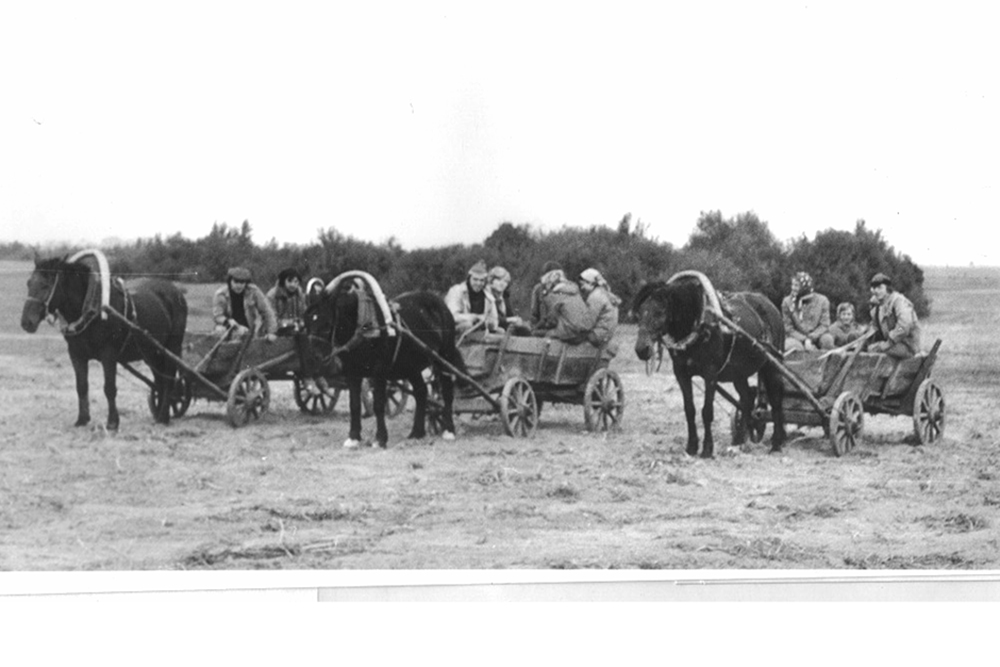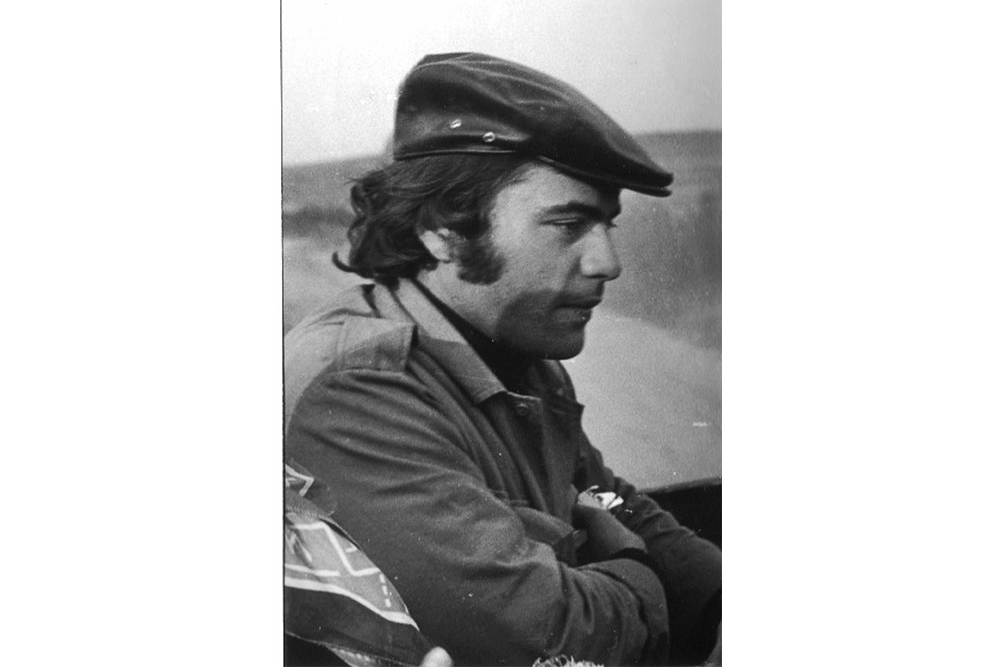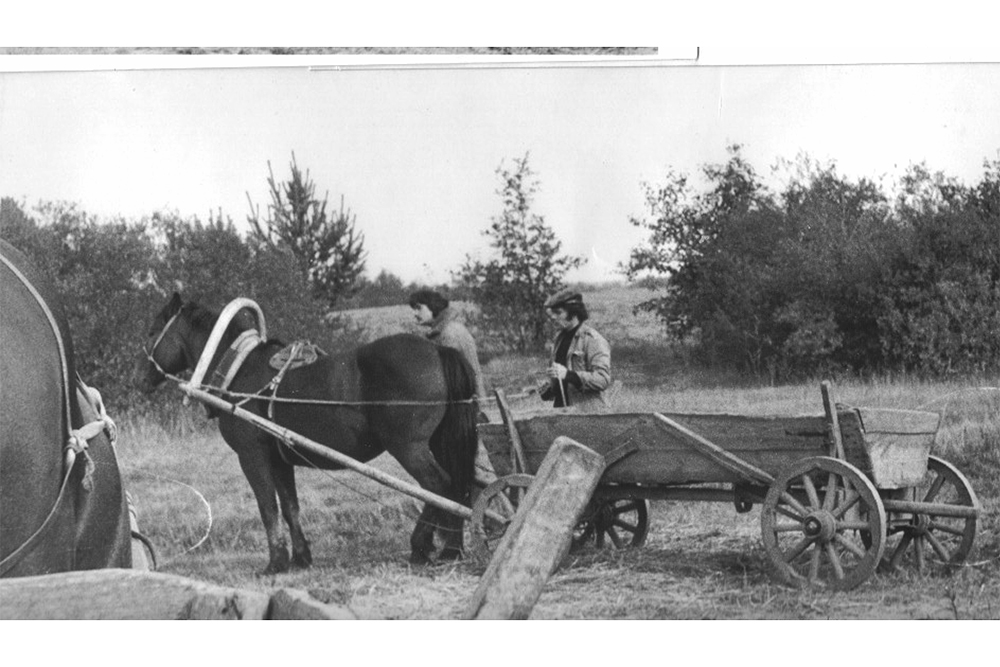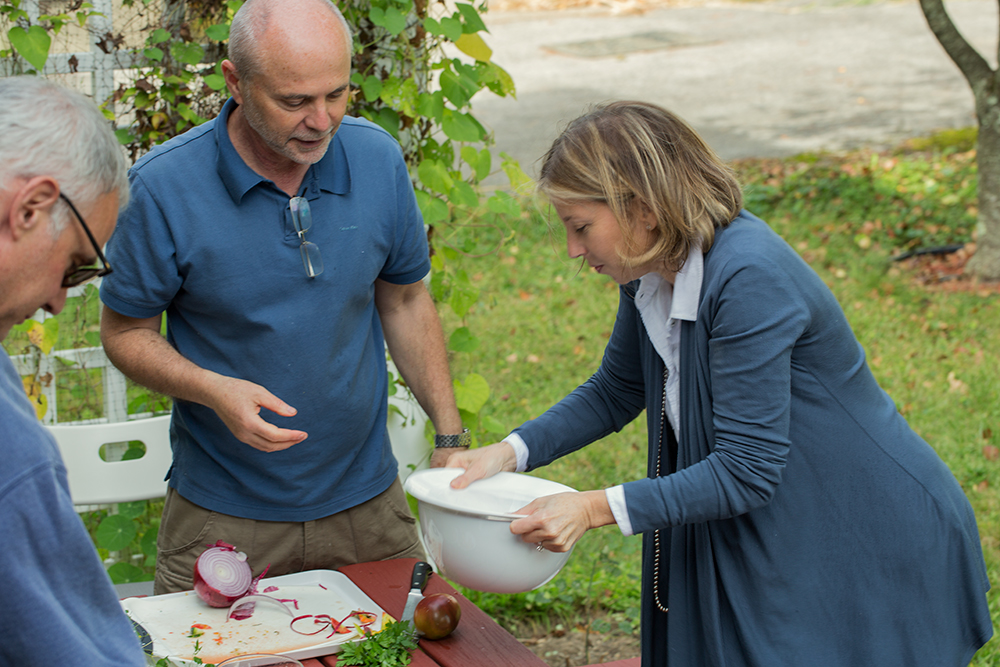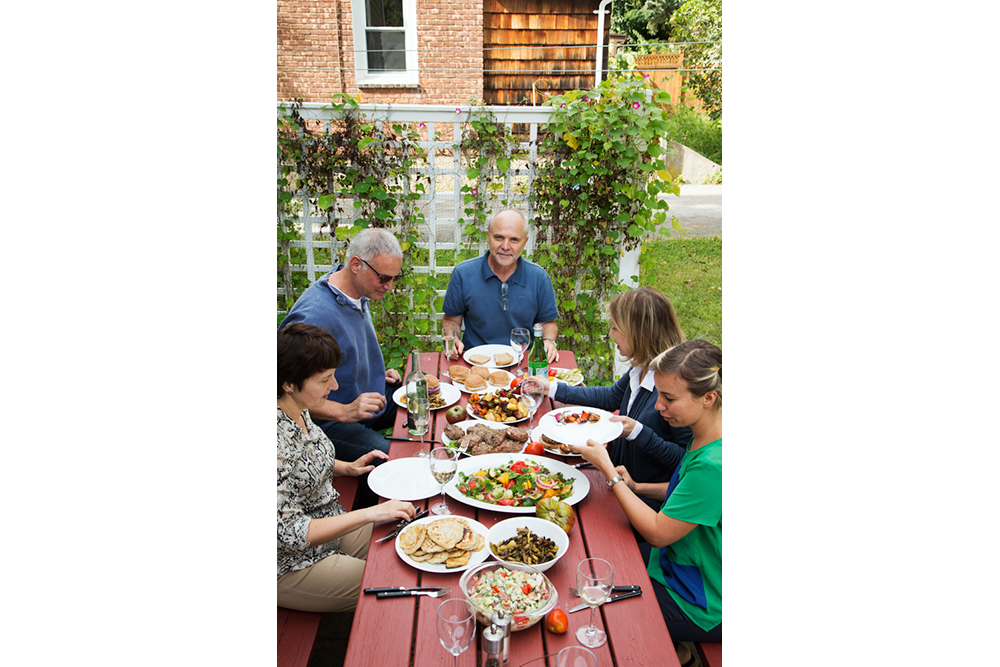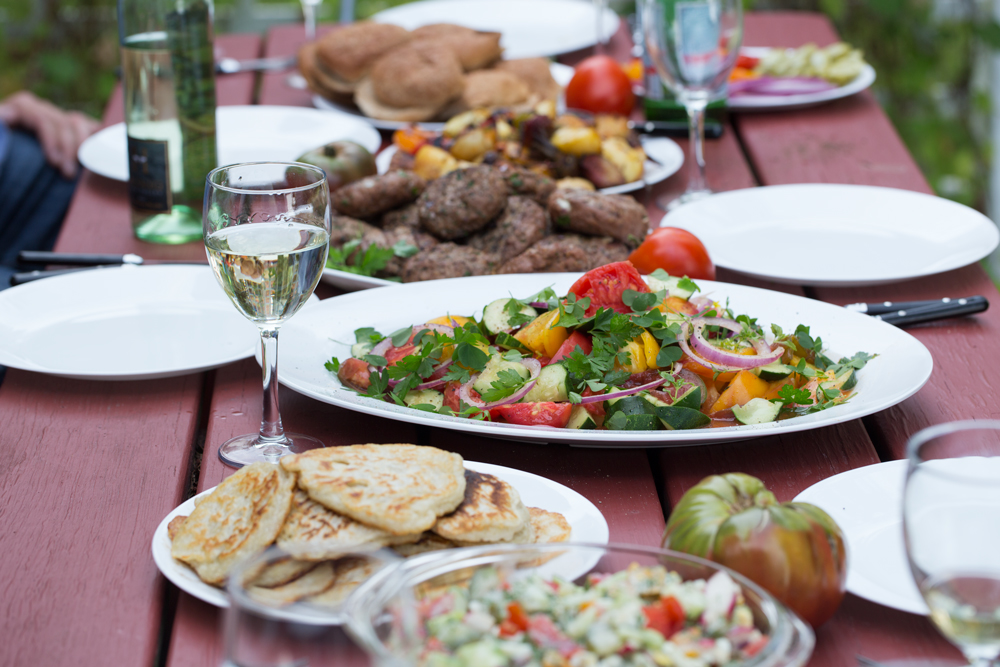
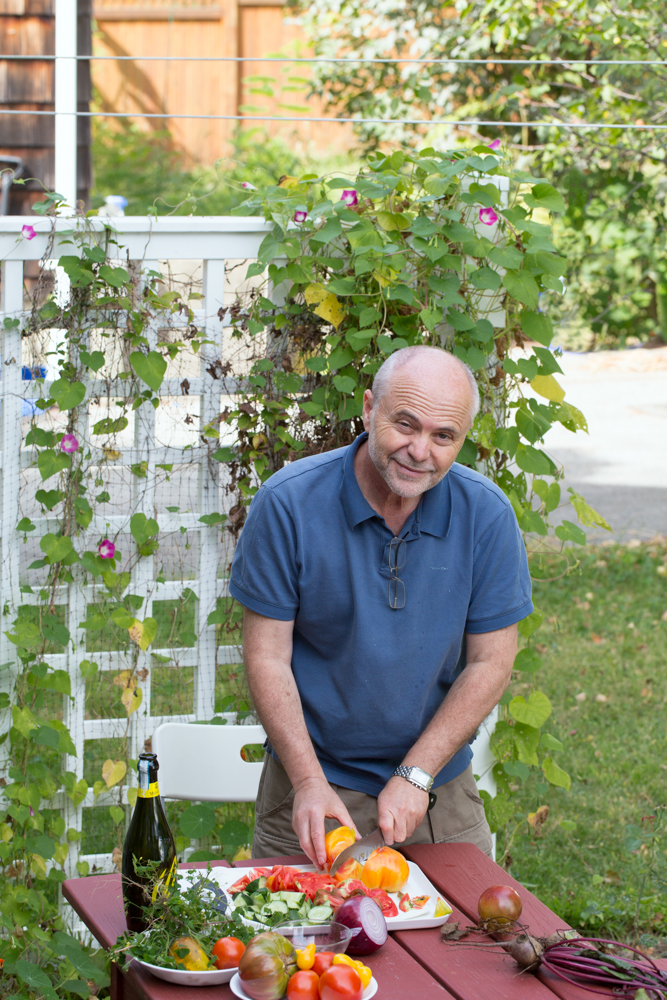
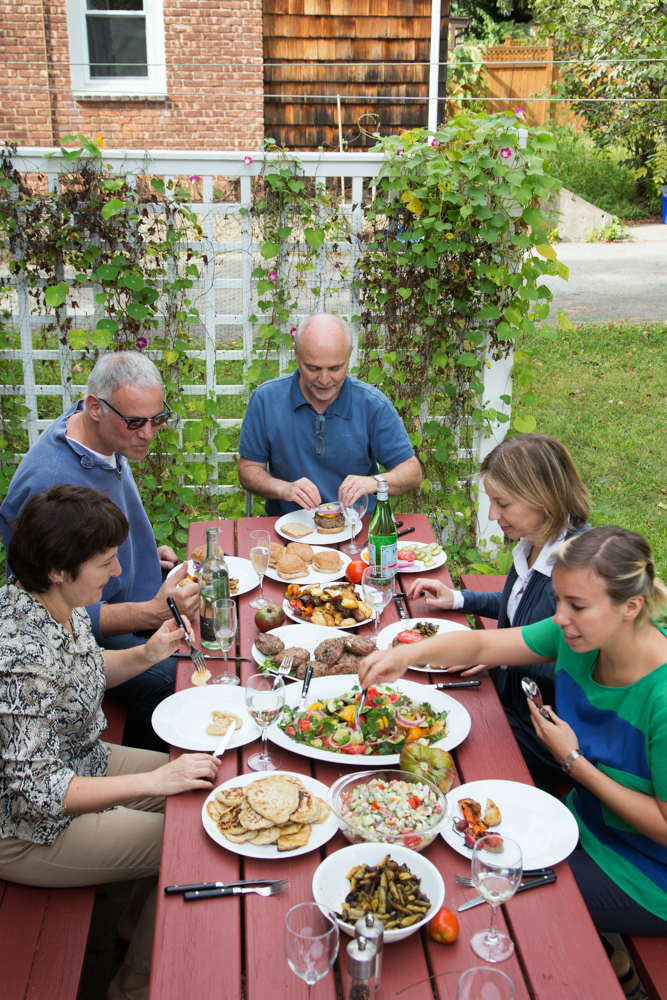
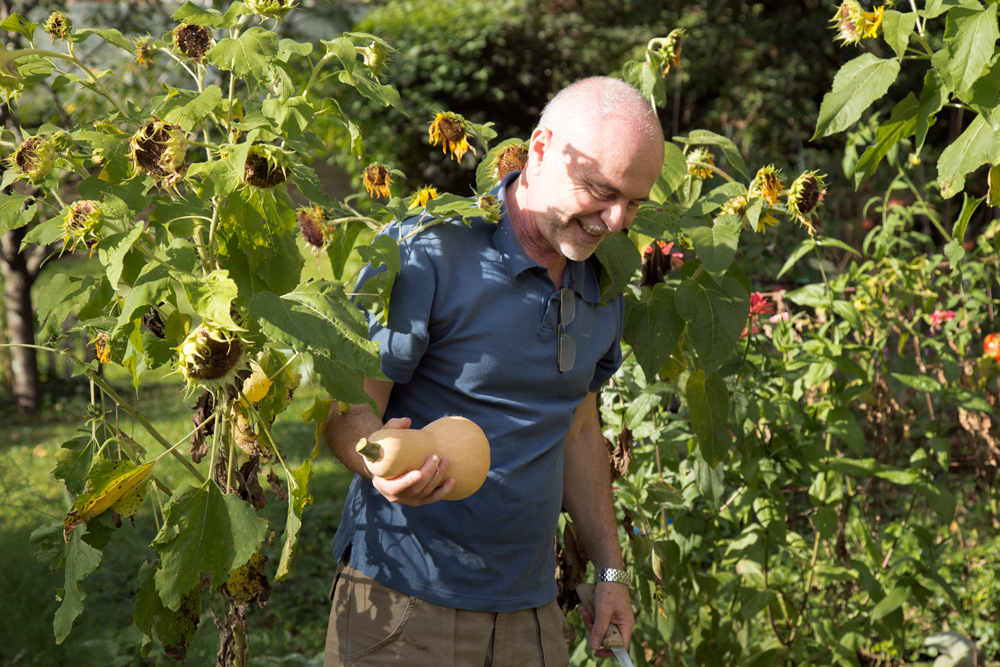
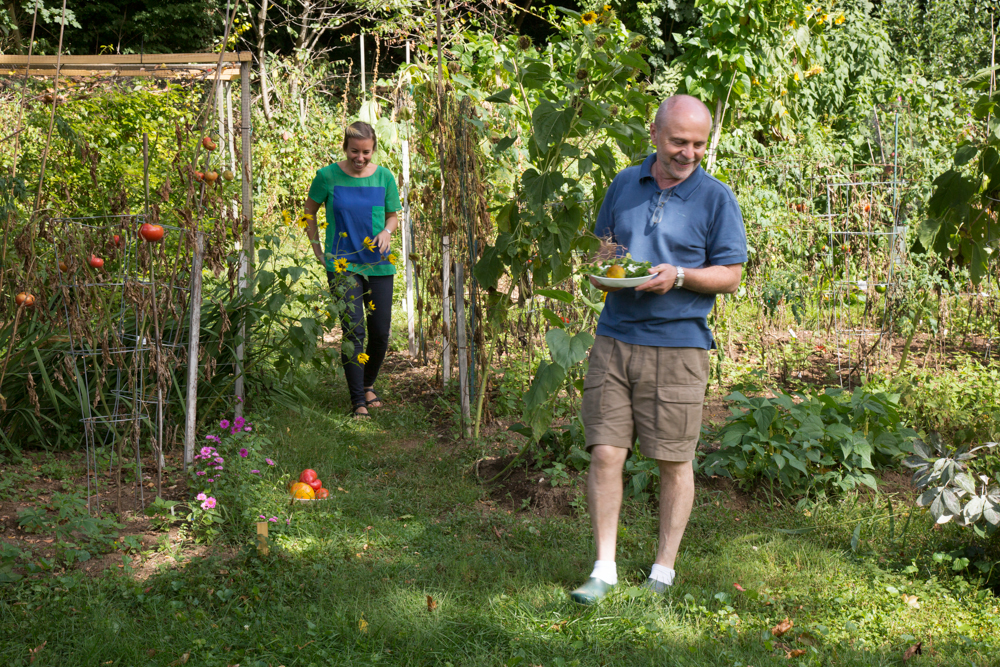
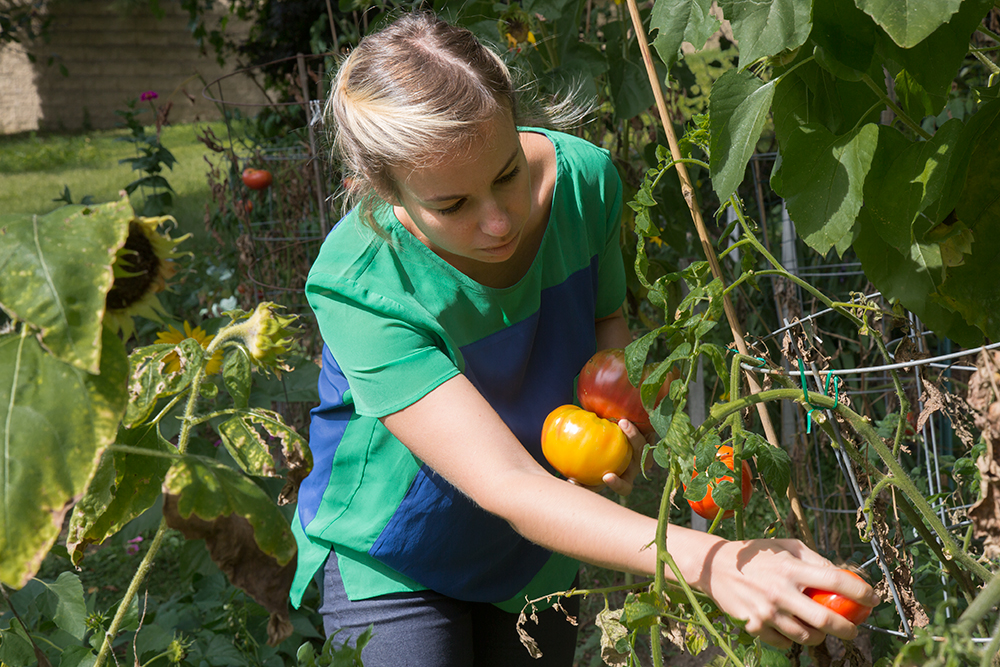
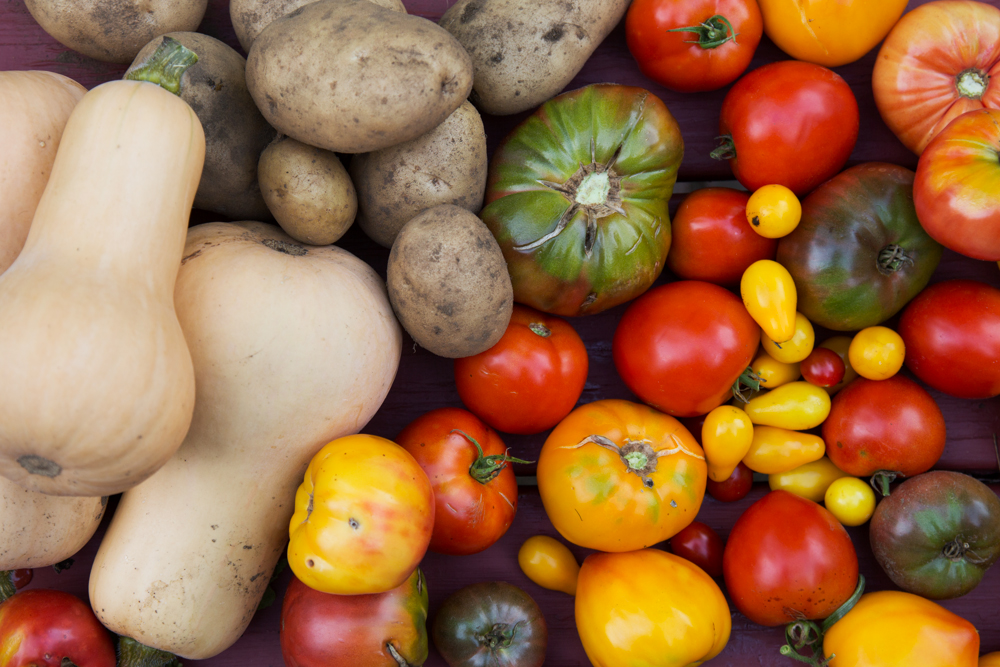
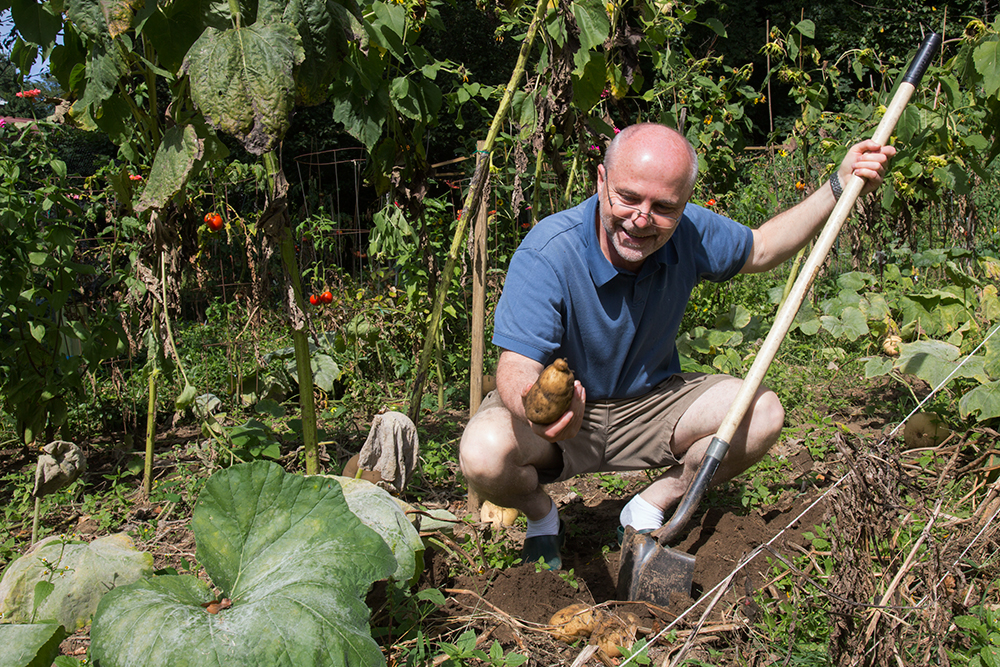
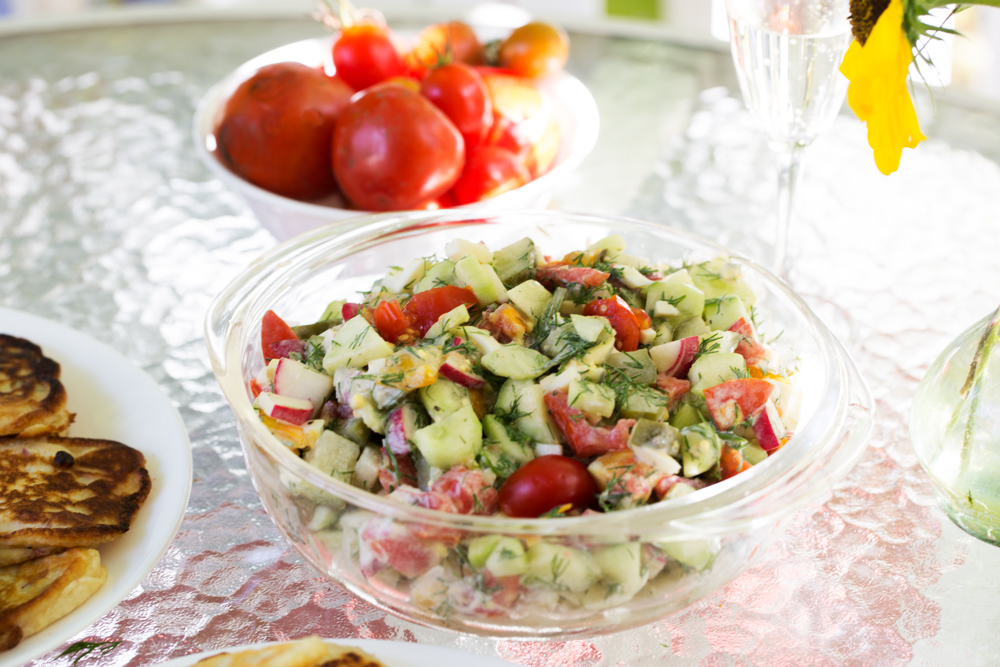
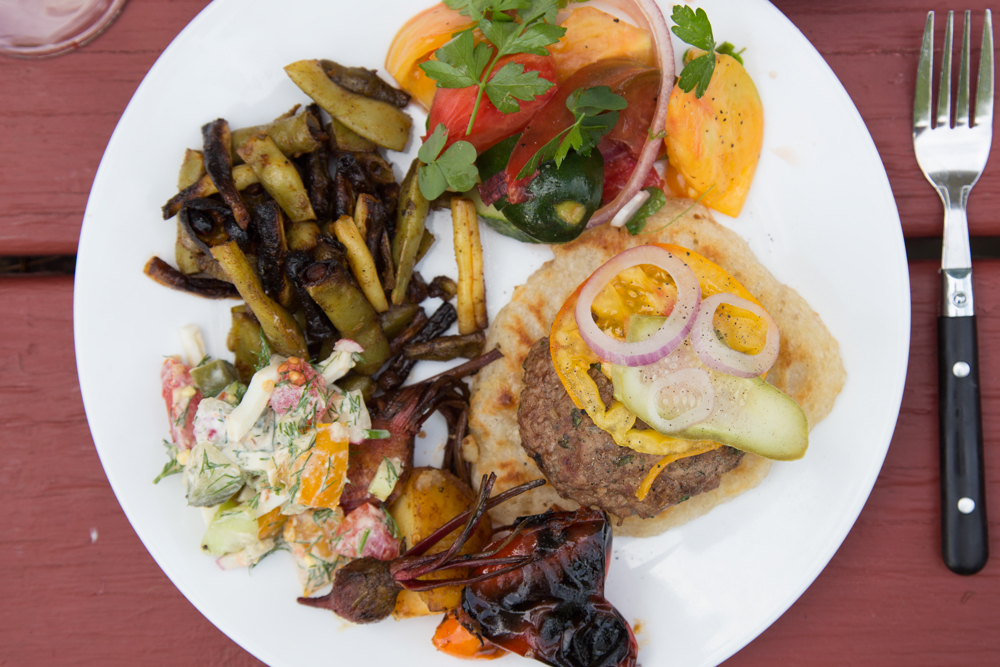
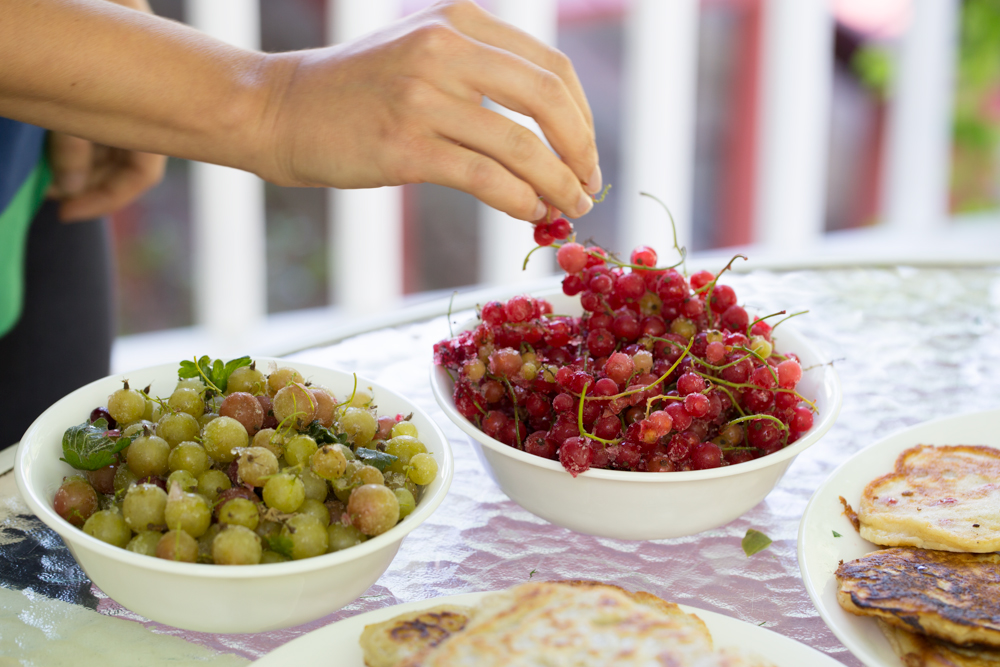
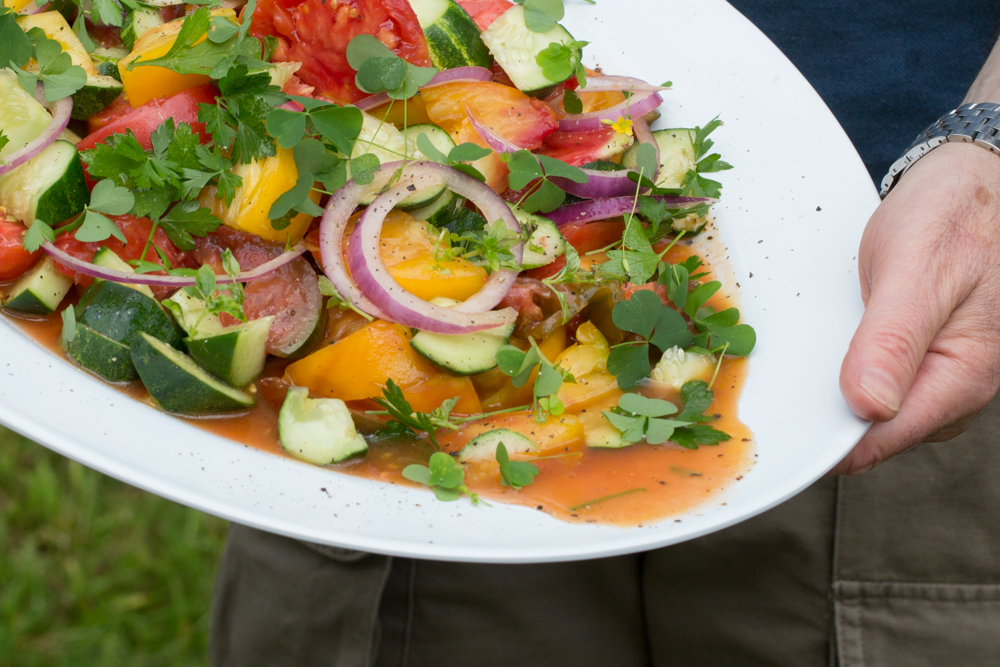
INGREDIENTS
- cucumber,
- heirloom tomatoes,
- onion,
- parsley,
- wood sorrel
NOTES
This is a very simple salad and requires the highest quality ingredients. It’s all about the veggies here. What was interesting to me was the fact that this salad did not call for any vinegar or acid: just oil, salt, and pepper. The finished salad is then shaken to bring forth the tomato juices, which are, of course, quite acidic. This juice plays the role of the dressing, for all intents and purposes. Sonel told me that her family often fights for first dibs to dip their bread into that tomato puddle.
Vlad not only grew the cucumbers and tomatoes for the salad, he grew every single vegetable on my plate.
I convinced Vlad to include some wood sorrel in his salad. This stuff grows wild everywhere, and it tastes bright and lemony and looks like clover. Go find some. This must be foraged.
RECIPE
DIFFICULTY
EASY
SERVES
6
PREP TIME
5 MINS
Salad
-
2-3largeheirloom tomatoes
-
3smallpersian cucumbers
-
1smallred onion
-
4-5sprigsfresh flat leaf parsley
-
4tbsextra virgin olive oil
-
salt and pepper to taste
INGREDIENTS
- cucumber,
- heirloom tomatoes,
- onion,
- parsley,
- wood sorrel
This is a very special post not from, but essential to, the MoMA PS1 Salad Garden.
Vladimir Goldin is an engineer who has maintained the climate control at The Museum of Modern Art and MoMA PS1 for the last 20 years. Those of you who are familiar with the inner workings of art institutions will recall that the humidity and temperature in the home of any art collection is crucial to its posterity. These environmental elements must remain constant to prevent works of art from expanding or contracting, rotting or cracking. This is the invisible but indispensable work of Vladimir Goldin, my dear friend and Sonel Breslav’s (of Blonde Art Books) Russian-born uncle.
When I invited Vladimir to the roof of MoMA PS1 to make a salad with me, he countered with an invitation of his own: would I like to come spend the afternoon with him in his vegetable garden in Westchester, where Russian pancakes would be served amidst a field of sunflowers and edible plants? Truth be told, Vlad had no intention of coming to the museum (his place of work) on the weekend. I accepted his generous offer, and Sonel and I set off to have one of the most pleasant, homegrown and home-cooked meals of the summer.
Vlad might be an engineer, but his passion is gardening, cooking, and, as I learned first hand, entertaining. On this perfect Sunday afternoon, there was no shortage of Prosecco and enough food to feed 20 people (Vlad insisted I eat a lamb burger and a turkey burger, savory pancakes and sweet pancakes, and he sent me home with a giant bag of his veggies). It is no small wonder that Sonel’s mother and father crashed our party; when they hear Vlad is cooking, they come running. Before feasting, we toured the garden, swapped tips and strategy, and spotted pollinators. Vlad is proud of his work in the garden, and his only regret was that we didn’t make it there earlier in the season, when the goldfinches were out and the gray zucchini in full bloom.
Vlad did not always have a green thumb, nor did he consider the garden to be a place of leisure and personal enjoyment. As a child in Soviet Russia, his parents forced him to work the land to feed their family every summer. They were lucky to have a place to grow their own food, but a youth spent gardening his family’s plot did not engender a passion for soil and plant life in young Vlad. This came many years later, when he had a plot of his own, fully grown kids and time to kill. Vlad has even begun to write a cookbook/memoir of family recipes entitled, The Pancakes of My Life (I love this title, and I am now considering The Salads of My Life as the title of my first book). Alongside recipes, Vlad describes his first memories harvesting and cooking what are now his favorite vegetable to grown in his garden, potatoes:
In the early seventies I was a young engineer and spent every fall collecting potatoes in the countryside…Potatoes were picked by hand. The machinery was available, but it was broken most of the time. As soon as the maintenance workers would remove the stones that were caught in the blades of these machines, they would throw them back into the fields, breaking the machines all over again. This is what they called, “job security.”
I was in charge of a group of six young ladies (brigada), the horse and a carriage. The horse knew what to do and the ladies politely ignored my attempts to lead. We were were self-sufficient; we fed ourselves with the potatoes we found in the fields. Potato pancakes were a reward for the days work. An 18” cast iron frying pan felt light after a day in the field, and peeling and grating 40 Lbs of potatoes did not seem like much effort.
Vlad Goldin in His Own Words
Julia: Where are you from exactly? How did you come to this country?
Vlad: I am from Minsk, Belarus. Barbara, my wife, is from Wroclaw, Poland. We met in Brooklyn. The family came to US in 1980. Right before we left, my friend drove us to say farewell to my grandfather. On the way back, the car flipped and we got pretty banged up. My father had most injures, but we did not want try extending the visa. We left as we were – bruised stitched and him with a broken hand.
Julia: How did you become an engineer?
Vlad: My father was an engineer, but I got into it gradually. I went to Trade School because the students were treated more like adults (we could smoke in the corridors, have long hairdos and wear bell-bottom pants). I got accepted to the Polytechnic Institute after that, and studied at night for 6 years until I got my degree.
Julia: Tell me about your experience gardening as a kid. How did you come to love gardening as an adult?
Vlad: I did not like gardening as a kid. We had a summer cottage growing up, it was built by my father. This small lot in the suburbs was given to my grandma by her shoe factory union. We had to work in the garden to supplement the family food supply. I was afraid of worms, so I especially disliked digging in the soil. But I sure liked the berries and other things from the garden, which I would otherwise not have seen very often.
Julia: Tell me about that house, how did your father build it?
Vlad: My father salvaged wood from crates and the freight trains’ siding. He framed and sided the house by himself. The nails were hard to find, so he would straighten bent ones, and put them to use. Once riding his motorcycle, he saw a girl running after a ball in front of him. It was too late to stop and he fell to avoid hitting her. Just a few days later, he was laying injured in the middle of the cottage giving instructions to my mom on how to hang wallpaper.
Julia: Now, is gardening recreational for you, sustenance, or both?
Vlad: It is both. I love to eat the stuff, but even more, I enjoy being outside among sunflowers, birds, and all the plants I have cultivated over the years.
Julia: What is your favorite thing to grow in the garden?
Vlad: It must be potatoes. The plants are deep green, vigorous and very fast growing. They have beautiful purple or white flowers with geometrical yellow centers. Potatoes take me back to my childhood. Back then, the ones we did not grow ourselves were bought in huge burlap bags and stored for the winter in our improvised root cellar. I included a photo of me working at the collective farm potato field in Russia, when I was a young engineer. My potato harvesting skills were more valuable in September than engineering.
I also plant winter squash on the north side of the growing potatoes. As I harvest the potatoes, the squash grows and takes their place. I yield two harvests from one plot, and makes me feel like a, “real gardener.”
Julia: How often do you actually eat pancakes? You made three different kinds for me today — potato, currant, and apple. Do you always do this, or were you just showing off?
Vlad: I was showing off. The sweet ones with gooseberries, apples and currants I used to make for breakfast for the kids when “breakfast” and the notion of a “morning” were a part of their lifestyle. The savory blini with sourdough and potatoes I just made yesterday. I need to “feed” and use sourdough starter every weekend to keep it alive and potatoes from the garden need to be used up also, so there you go, potato pancakes.
Julia: You made all the furniture in your house. How did you learn to do that?
Vlad: My father could do everything – shoe-making, sewing, carpentry, plumbing and electrical (even though with occasional pipe leaks and flying sparks). I guess I learned a few things just by watching him. When Barbara and I started our life together here, making a bed or a wall unit myself, was significantly cheaper than buying one. Plus, our taste is contemporary and Ikea was not around yet.
Julia: We talked about food a lot at your table. What is Gogel Mogel, this panacea of a drink you had as a kid? Your sister is convinced this is the origin of the word, “Google.”
Vlad: Gogel Mogel is similar to eggnog. Mostly raw egg and sugar. Mom would make this as as a treat or a cold remedy for us kids. We loved it.
